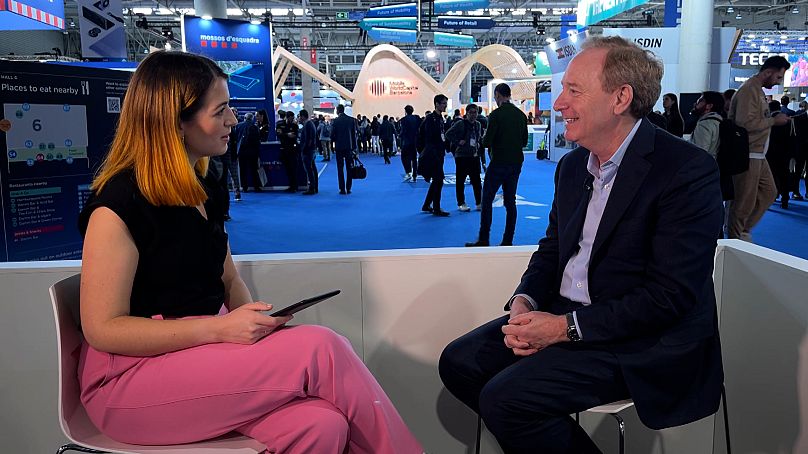In an interview with Euronews, Brad Smith, President of Microsoft suggests that if AI ‘is the most powerful technology in the world, shouldn't it have at least as much regulation as a carton of milk?’
Microsoft was founded in 1975, almost 50 years ago, and is now one of the largest companies in the world. In fact, you’ll struggle to find anyone in the western world who hasn’t used a Microsoft product.
In early 2024, they overtook Apple as the world’s most valuable company with a market capitalisation of $3.049 trillion (€2.809 trillion). Only the second company ever to surpass a value of $3 trillion.
Though much of our day-to-day interactions with Microsoft come through Excel, Word or Xbox, just like every other big tech company, AI is the topic at the forefront of their innovation programmes.
In this special episode of The Big Question, from Mobile World Congress in Barcelona, Brad Smith, President and Vice-Chair of Microsoft, discusses how AI will change life as we know it.
How does the President of Microsoft view its purpose?
Despite being a public company and therefore working to make their shareholders a profit, Brad insists one of the key things that keeps him coming to work everyday is “the opportunity to feel that your technology is serving the public good.”
That might sound like an idealistic view, and the sceptic in many of us will question if serving the public good wasn’t so lucrative would they still continue to do it?
But with their recent announcement on AI Access Principles in which they have open-sourced their AI models with a view to helping all countries establish their own AI economy, it’s hard not to be drawn into Brad’s infectious enthusiasm for its societal changing potential. (It will, of course, continue to make them a lot of money.)
“For us, we're doing something that no one did in, say, the age of electricity. There was nobody who tried to build power plants everywhere. As a result, there are still 700 million people in the world that do not have access to electricity.
“So we're trying to move this technology around faster than anybody has ever done for something similar,” Brad explains.
For Brad, nothing has changed the world in the same way AI will since the printing press.
“The printing press made it possible for people to write and people to read. And in so doing, it made it possible for people to think and share their thoughts and other people to learn. AI is a tool that can do all of that again.”
What is an AI economy?
Revolutionary technological advances in history bring with them a whole new sector of the economy. It’s not just the people working directly in the data centres but those supplying the infrastructure, parts and services to make it all run.
“And in a way that's similar to the printing press, which brought together not just a printing press, but ink and paper and bookbinders and book publishers and booksellers so that readers and writers could flourish.
“All of the participants in this new AI economy actually need to depend on each other and flourish together.”
Although the AI economy will look different in each country because of regulations and infrastructure, Brad says there’s eagerness from many countries for AI to be “the new foundation for their economy.”
How is Microsoft battling the misuse of AI?
“I think our purpose in this era of time, hopefully is to create technology that is going to help the world solve the problems we need to solve,” Brad says.
Although Brad is excited about AI’s capacity to change life as we know it, it’s not without concern.
“Sometimes in the tech sector, people look at me or look at Microsoft and they say, ‘What's wrong with you? How can you be in an industry and say that regulation of it is good?’” Brad tells The Big Question.
But unlike others, he is all in favour.
Although others in the future might get it wrong, Brad insists we have to get regulation right now so that others in the future aren’t just digging their way out of our hole.
The particular misuse that Brad fears is the exploitation of generative AI to produce ‘deepfake’ videos or content with the potential to influence elections.
“Somebody can put it out about a political candidate, and yet that candidate will have never seen or said anything that people are seeing and hearing.”
In mid February, Microsoft along with several other tech giants, signed the Munich Tech Accord to help prevent this from happening.
“It's what we need to do to ensure that we protect our elections this year and, frankly, protect the democracies of the world for the future,” Brad adds.
The Big Question is a series from Euronews Business where we sit down with industry leaders and experts to discuss some of the most important topics on today’s agenda.
Watch the full episode above to learn more about Microsoft’s vision of the future of AI.












